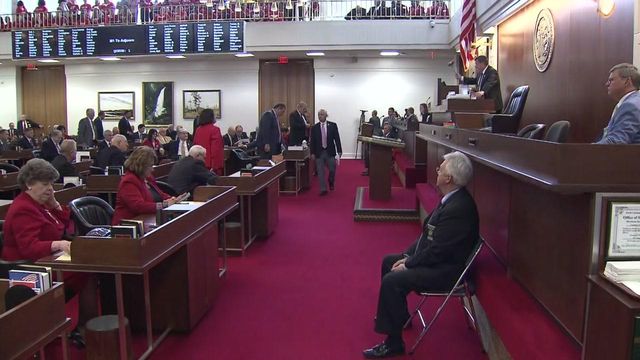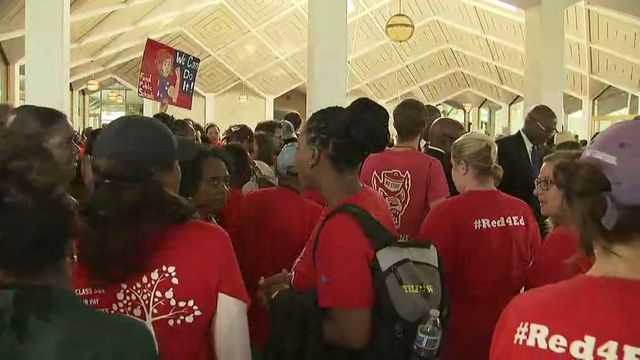Beyond protests, what to expect from this legislative session
A budget, no tax increase, an actually short session and perhaps some constitutional amendments.
Posted — Updated- Legislative sessions are unpredictable.
- Short sessions, held in even years as the two-year state budget plan nears its second year, are primarily about tweaking that budget. But see No. 1.
Cooper would use that money to boost teacher pay and education funding beyond increases already written into the two-year budget, a difference that's helping to fuel the mass teacher protest expected to greet legislators on their return to session.
Cooper also included a 2 percent raise for state employees in his budget. GOP leaders kept their own plans on this close to the vest in a press conference Tuesday, but House Speaker Tim Moore said "some type of raise" is likely. The State Employees Association of North Carolina has members contacting legislators to back the governor's budget, and Executive Director Robert Broome said on Twitter this week that the group generated more than 1,500 messages in a day.
"We’re just getting started," he said.
The defining characteristic of this short session, Moore and others have said in recent weeks, is that it will be short, which is not always the case. Key leaders from both chambers have said they plan to be out by July 4.
Speed calls for vigilance, Rep. Grier Martin, D-Wake, said this week. A leader in the minority party, Martin said he expects efforts to wedge policy changes into the budget. That's one way to pass them with less scrutiny and without a clean vote just on the policy in question.
"I haven't talked to anyone about that," said Berger, R-Rockingham. "Does he still have any?"
"If you have any suggestions, let us know," Moore, R-Cleveland, joked during a joint press conference with the Senate leader.
Berger also said not to expect legislation this session to allow sports betting, a change made possible this week by a U.S. Supreme Court decision striking down the federal ban.
"I'd be surprised if we have the ability to analyze that and make any decisions one way or another (this session)," he said, noting that he hasn't yet read the court's ruling.
Constitutional amendments, which would go to a statewide referendum if approved by three-fifths of the legislature, remain a possibility, but leadership hasn't publicly singled any out.
There's consistent talk among other legislators, though, of potential amendments to require photo identification at the polls and to cap the state's income tax rate. Other possibilities: Something enshrining the right to hunt in the state constitution and a long-discussed removal of the state constitution's defunct, but still present, voter literacy test.
"I don't think that's going to be part of anything going forward," Sen. John Alexander, R-Wake, assured Wake County commissioners this week.
The commissioners gathered for a pre-session conversation with local legislators on Monday. Chairwoman Jessica Holmes and others called for more nurses, counselors and social workers in K-12 schools, which was a major topic during off-session reviews of school safety needs.
"Identifying students who are at risk and getting them the treatment they need is safer for everyone in any education setting, rather than waiting until it’s too late and hoping a school resource officer is in the right place at the right time or assuming that he or she has the proper training and courage to address the situation," Holmes said in an email after the meeting.
Legislators spent a lot of time during the off-session months discussion judicial redistricting and a potential change to appoint judges instead of electing them. Those plans don't appear to have the support needed to move forward, at least not statewide. Smaller redraws in areas where legislators agree there are problems with the lines could move, though. Rep. Justin Burr, R-Stanly, who has pushed judicial redistricting, lost his re-election bid in a primary last week.
“I think there’s still a lot of disagreement on it," Senate Majority Leader Harry Brown said of the issue during a weekend appearance on Spectrum's "In Focus with Loretta Boniti" show.
“I think you’ll see something," said House Majority Leader John Bell, who also appeared on In Focus. "We have to see something moving forward.”
Even Berger, as in-the-know as anyone at the statehouse, said it's difficult to predict what legislation will get traction as 170 members come to town. Some of those members won’t be back next year, either because of retirement or a lost primary. The rest have campaigns to run before the November elections decide control of the two chambers, and members are limited in the fundraising they can do during session.
Said Berger: "We'll have to wait and see what the coming session and coming weeks will bring in more detail."
Related Topics
• Credits
Copyright 2024 by Capitol Broadcasting Company. All rights reserved. This material may not be published, broadcast, rewritten or redistributed.






